Trump Is Obsessing Over the Wrong Guy
The Mueller investigation threatens the presidency in a way that the publication of "Fire and Fury" never will.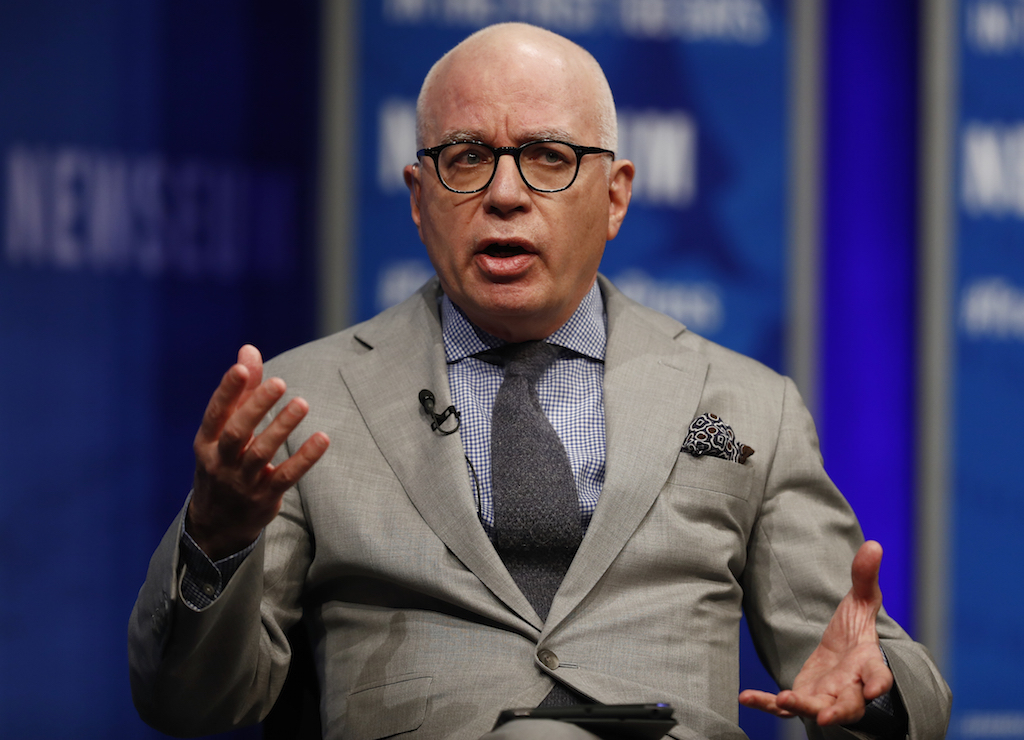 Michael Wolff, the author of "Fire and Fury," speaking at the Newseum in Washington, D.C., in April 2017 for "The President and the Press: The First Amendment in the First 100 Days" forum. (Carolyn Kaster / AP)
Michael Wolff, the author of "Fire and Fury," speaking at the Newseum in Washington, D.C., in April 2017 for "The President and the Press: The First Amendment in the First 100 Days" forum. (Carolyn Kaster / AP)
I’m going to step out of character and offer Donald J. Trump, the 45th president of the United States, some frank, if unsolicited, advice instead of my usual criticism.
Mr. President, let the publication of “Fire and Fury,” journalist Michael Wolff’s scathing portrait of life inside your administration, pass. Refocus your attention on the Mueller investigation. It threatens your presidency in a way that Wolff never will.
If you want to bring the investigation to a close—as you repeatedly have said—renew the pledge you made last June in a Rose Garden news conference that you are “100 percent” willing to testify under oath about everything you know and everything you’ve done. The investigation is going to wind up with you in the witness box anyway. You might as well take the stand sooner rather than later—for your sake and the good of the country. Let’s get this over with.
Now, I don’t think for a minute that the president will heed my counsel or any similar suggestions that might come in the near term from more familiar sources. At the moment, Trump is seething about Wolff. He’s so hopping mad and fixated that he sought to stop the publication of “Fire and Fury,” authorizing one of his personal lawyers to send the author and his publisher, Henry Holt and Co. Inc., a cease-and-desist letter before the book’s Jan. 9 scheduled release date. The letter also threatened a libel action if the publisher didn’t relent.
Undeterred, Henry Holt and Co. responded by accelerating the book’s publication to Jan. 5. Since then, sales have skyrocketed. Currently, “Fire and Fury” ranks No. 1 on the Amazon.com top 100 chart. The book also has been the subject of nonstop breathless discussion on cable news.
But as bad as the fallout from the book has been, I would tell the president to let the news cycle run its course. Americans have short attention spans, and in due time, Wolff will become yesterday’s story.
I would tell the president that the law is decidedly against him in his attack on Wolff and Henry Holt. The Supreme Court has long interpreted the First Amendment to disfavor prior restraints on the press. I would remind the president of Daniel Ellsberg and the Pentagon Papers case that ended so badly for Richard Nixon.
I also would remind the president of the important protections the Constitution affords journalists in defamation actions brought by public figures, among whom Trump is the absolute archetype. Even with top-notch attorneys working for him—and contrary to what you might hear on MSNBC, some of Trump’s lawyers are excellent litigators—it is unlikely he will achieve his long-stated goal of “opening up” the nation’s libel laws. Why waste time and precious legal resources on a losing battle that in any event doesn’t have to be waged?
On the other hand, Justice Department special counsel Robert Mueller, unlike Wolff, has to be dealt with. Mueller already has indicted two top Trump campaign aides—Paul Manafort and Rick Gates—on charges of money laundering, failing to register as foreign agents, conspiracy against the United States and other serious federal felonies stemming from their work on behalf of the former pro-Russia government of Ukraine. In addition, he’s secured a guilty plea from Trump’s first national security chief, Lt. Gen. Michael Flynn, for lying to the FBI about his post-election contacts with Russia’s then-Ambassador Sergey Kislyak concerning the lifting of U.S. sanctions. Former foreign policy adviser George Papadopoulos also has pleaded guilty to lying about his attempts during the campaign to obtain dirt on Hillary Clinton from Russian sources.
As I have written before, no one seriously believes that Mueller is finished. Both Donald Trump Jr. and the president’s son-in-law, Jared Kushner, are vulnerable for various acts and omissions that fall within Mueller’s broad mandate to investigate “any links and/or coordination between Donald Trump’s election campaign and Russia, and any matters that may arise directly from the investigation.”
The president is personally in jeopardy for possible obstruction of justice. That, in my view, is what Mueller will eventually subpoena Trump to address under penalty of perjury, either in a deposition or before a grand jury, or by means of written interrogatories, or some combination of the three. Why, then, shouldn’t the president take the proactive step of asking to state his side of the story under oath instead of waiting for Mueller to pounce?
If and when Trump does testify, he would by no means be the first president to do so. In 1862, Abraham Lincoln voluntarily appeared before the House Judiciary Committee to answer questions regarding the premature publication of his December 1861 message to Congress. In 1919, Woodrow Wilson answered questions from members of the Senate Foreign Relations Committee at the White House regarding the formation of the League of Nations. In 1974, Gerald Ford delivered testimony under oath before the House Judiciary Subcommittee on Criminal Justice about his reasons for pardoning Nixon.
Nixon, for his part, testified before a federal grand jury in 1975, a year after his resignation from office, about his involvement in the Watergate scandal.
And then there is Bill Clinton, who surely holds the presidential record for taking the stand, giving testimony at the White House in 1994 and 1995 about the Whitewater affair (the ill-fated Arkansas land deal that, by dribs and drabs, led to his impeachment), as well as videotaped testimony in the 1996 criminal trial of James and Susan McDougal, his onetime Whitewater business partners.
Clinton also sat for a deposition in the 1996 trial of two Arkansas bankers who were accused of making illegal campaign contributions to his 1990 gubernatorial bid. And most famously of all, in 1998, he not only was deposed in the sexual harassment case brought against him by Paula Jones, but he was questioned at length by special prosecutor Ken Starr about his relationship with White House intern Monica Lewinsky. Starr’s cross-examination was videotaped and presented to a Washington grand jury.
Whether the dramatis personae are Starr and Clinton or Mueller and Trump, the key to delivering successful testimony is preparation. Prior to raising your right hand, it helps to know the strengths and weaknesses of your own case, as well as your adversary’s.
To joust with Mueller face-to-face, Trump—or at least the attorneys who represent him—will have to understand and master the complex law of obstruction.
There are many ways to do that, of course, but a good place to start would be with the analysis set forth in the Brookings Institution’s study, “Presidential Obstruction of Justice: The Case of Donald J. Trump,” published in October. A 108-page tome of densely packed legal reasoning, the study offers the most comprehensive evaluation of the obstruction issue on the market. In almost every respect, it is the antithesis of Wolff’s breezy and gossipy prose.
And while the study is structured like a prosecutorial brief against the president, it explores both the case for obstruction and possible defenses to the obstruction charges that may be lodged against him. I came away from reading it with a new appreciation of the high bar that Mueller will have to meet to make an obstruction charge stick, either in a criminal proceeding (assuming one can be brought against a sitting president—an issue that remains unsettled)—or by way of an impeachment referral to Congress. It’s not going to be as easy as some might suppose to prove Trump guilty, but the groundwork has been laid.
The relevant federal laws on obstruction are found in Title 18, Sections 1501 through 1521, of the United States Code. Together, they make it a felony to “corruptly” influence or impede the “due administration of justice” in court proceedings or investigations conducted by federal agencies or congressional committees.
The Brookings study explains in depth that the statutes criminalize both attempts and completed acts. A defendant need not succeed at obstruction to be convicted. Nor is it necessary that an official “proceeding” already be underway at the time the defendant initiates his obstructionist conduct, as long as it is “reasonably foreseeable” that an official proceeding will be convened.
Most critical of all for the president and his attorneys, the study points out that obstruction is an independent felony. No other underlying criminal activity need be established to render one guilty of obstruction. The federal case law on this point is clear. Just ask Martha Stewart, who went to prison after being convicted of obstruction, but not for the underlying offense of securities fraud.
This means—and it cannot be stressed enough—that Mueller will not have to prove that Trump or his presidential campaign “colluded” with the Russians in order to charge the president with obstruction, or win a conviction. Both Trump and his many sycophants have repeatedly and loudly gotten this point dead wrong.
As I and many other legal commentators have noted, outside of the antitrust context, collusion is not a federal criminal offense. But obstruction is, and the president arguably has engaged in an extensive pattern of obstruction of the Russia probe that predates the now-infamous request he made in February to then-FBI Director James Comey that he “let go” of the investigation into Flynn’s undisclosed post-election contacts with Kislyak about the lifting of sanctions. By the time Trump fired Comey in May—and admitted to NBC anchor Lester Holt in a nationally televised interview that he had done so because of the Russia investigation—Flynn was under investigation by a grand jury in Virginia.
The acts of obstruction Mueller is no doubt considering include, but are by no means limited to:
● Requesting personal loyalty from Comey in January 2017.
● Firing then-acting Attorney General Sally Yates in January 2017, after she had brought Flynn’s conduct to the attention of White House counsel Donald F. McGahn II.
● The overture to Comey regarding Flynn in February 2017.
● Requesting in March 2017 that Director of National Security Dan Coats and CIA Director Mike Pompeo intervene with Comey about the Flynn investigation.
● Insisting in March 2017 that McGahn instruct Attorney General Jeff Sessions not to recuse himself from overseeing the Russia probe, and complaining, according to The New York Times, “Where is my Roy Cohn?” The president was referring to his former attorney and personal “fixer,” who died in 1986 and who had gained notoriety as a top aide to Sen. Joseph McCarthy.
● Firing Comey in May 2017.
● Helping in July 2017 to rewrite Donald Trump Jr.’s misleading account of the purpose of the meeting the younger Trump had convened in June 2016 with a Kremlin-connected lawyer at the Trump Tower in Manhattan.
● Allegedly orchestrating an effort that continues to this day to discredit and undermine the work of Mueller.
Still, the president would not be without significant defenses to an obstruction case. He could argue—correctly on the law, as the Brookings paper indicates—that the obstruction statutes do not apply to FBI investigations that have not yet been referred to the courts or to a grand jury, and that he did not know of the existence of the grand jury that was looking into Flynn or other targets on any of the dates in question.
More importantly, he could claim that he lacked the legally essential “corrupt” intent in performing any of the acts listed above, but was merely exercising his lawful authority as president and inquiring into the status of an investigation that he believed had no merit and was otherwise impeding the performance of his duties.
The point is, we deserve answers, and we can only get them from the man in charge. We can either wait until Mueller indicts more members of Trump’s inner circle en route to his endgame of going after the president directly, or the president can take the initiative and volunteer to meet with Mueller and answer questions in person, on the record, under oath.
To be sure, the president has other options. He can attempt to fire Mueller, or pardon those Mueller has indicted or will indict (perhaps including himself), or he could take the Fifth Amendment and decline to testify when the hour to do so arrives.
But those would be the acts of a coward—not unlike what we might expect from the weak, thin-skinned, unstable man described by Wolff in his best-selling book—one that the president insists is a work of fiction.
Editor’s note: Unconfirmed press reports Monday indicate that Robert Mueller is pressing to interview Donald Trump under oath.
Your support matters…Independent journalism is under threat and overshadowed by heavily funded mainstream media.
You can help level the playing field. Become a member.
Your tax-deductible contribution keeps us digging beneath the headlines to give you thought-provoking, investigative reporting and analysis that unearths what's really happening- without compromise.
Give today to support our courageous, independent journalists.
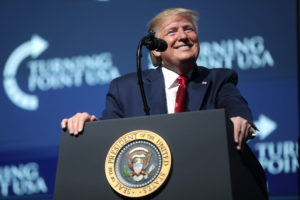
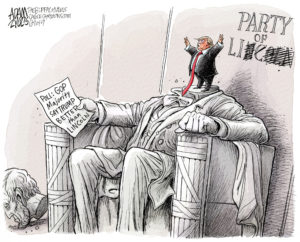
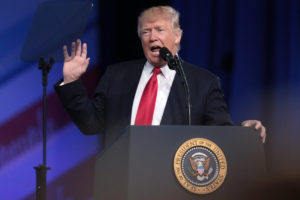
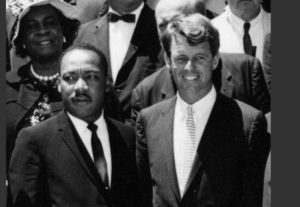

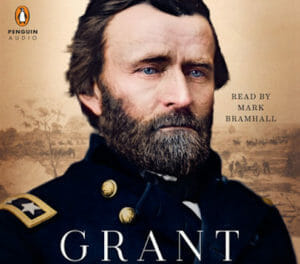
You need to be a supporter to comment.
There are currently no responses to this article.
Be the first to respond.